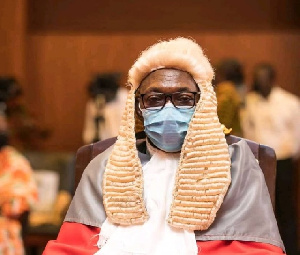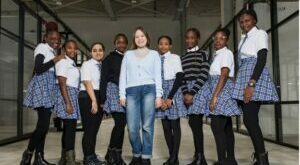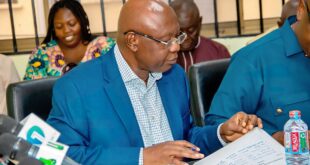Justice Clemence Jackson Honyenuga, the judge at the trial of former COCOBOD Chief Executive, Dr Stephen Opuni and businessman Seidu Agongo, was once removed from the case after being found to have exhibited bias tendency towards the first accused.
“There is a real likelihood of bias on the part of the trial judge, Clemence Jackson Honyenuga (JSC) sitting as an additional High Court judge in view of the fact that he has made final findings of facts and has predetermined and prejudged the case before hearing Applicant,” this is what the lawyers of Dr. Opuni told judges at the Supreme Court last year which the judges concurred.
Justice Honyenuga has on a number of occasions been cited for acting and making utterances that suggest that the accused persons would not get fair trial in his court.
Several applications were therefore filed in the past to get him removed. Some of these applications were heard by he himself, which he conveniently binned.
One of his rulings which became the talk of town was when he harshly said Dr. Opuni has an ocular problem and has been “hallucinating” in his court as he described portions of the motion to recuse himself as “disgusting”.
The former COCOBOD Chief Executive, Dr. Stephen Opuni and businessman Seidu Agongo as well as Agricult Ghana Limited, have been facing 27 charges, including defrauding by false pretences, willfully causing financial loss to the state, corruption by public officers and contravention of the Public Procurement Act in the purchase of Lithovit liquid fertiliser between 2014 and 2016.
They have pleaded not guilty to the charges and are on a GH¢300,000.00 self-recognizance bail each.
This was after the then Senior Minister Yaw Osafo Marfo had ordered the CID of the Ghana police to take over the case from the Economic and Organised Crime Office (EOCO), leading to his niece Evelyn Keelson signing the charge sheet as a Senior State Attorney.
PRIMA FACIE
The trial officially began in March 2018, and well after three years, the state closed its case after calling seven witnesses. The accused persons then filed for submission of no case in April 2021.
But Justice Honyenuga established a prima facie against the three accused persons and ordered them to open their defence.
In his 89-page ruling dismissing the the submission of no case applications, the judge made certain controversial pronouncements including an unpopular decision to expunge, in his closet, as many as 18 Exhibits that were tendered in an open court by the defendants without any objection. According to counsel for the accused persons, these 18 exhibits exonerate their clients.
Counsel for Dr Opuni, Samuel Codjoe, who felt Justice Honyenuga had prejudged his client, even before he was heard, resorted to the Supreme Court for justice.
“We also submit that by rejecting exhibits 58, 59, 60, 61, 62, 63, 64, 65, 66, 67, 68, 69, 70, 71, 72, 73, 74, and 75 whilst retaining exhibits PP, LL series and MM series, the trial judge has not only erred but has by his conduct exhibited real likelihood of bias against Applicant,” the statement of case stated in part in June 2021.
They therefore prayed the Supreme Court to remove Justice Clemence Honyenuga from the case and also quash his decision to expunge the 18 exhibits.
HONYENUGA’S TEMPORARY REMOVAL
In July 2021, the Supreme Court in a three-two (3-2) majority decision prohibited Justice Honyenuga from hearing the criminal case for exhibiting bias tendencies towards Dr. Opuni.
The Supreme Court had held that in dismissing the submission of no case filed by Dr Opuni, Justice Honyenuga made certain pronouncements which could be interpreted that he (the judge) had already found the accused persons guilty even before they opened their defence.
Such an act, the court held, gave rise to a likelihood of bias.
According to the court, Justice Honyenuga’s duty at the ruling on submission of no case was to establish whether or not a prima facie case had been made against the accused persons, but the pronouncements he made was as if the prosecution had proved its case beyond reasonable doubt.
“A reasonably well-informed observer, taking account of the exclusion of the exhibits that appear to favour the accused person and the pronouncements made by the judge which connote that the 2nd and 3rd accused persons have defrauded COCOBOD and it would not have happened but for the applicant (Dr Opuni) herein deliberately and knowingly facilitating it and that by that he has caused financial loss to the state, would come to the conclusion that the judge would not be impartial in the consideration of the any defence the accused person has to put forward,” the majority decision authored by Justice Gabriel Pwamang, who was joined by Justices Agnes Dordzie and Issifu Omoro Tanko, stated .
Justices Dotse and Lovelace Johnson dissented.
The Supreme Court therefore prohibited Justice Clemence Honyenuga from further hearing the trial.
Also, the court quashed certain portions of the ruling on the submission of no case in which Justice Honyenuga expunged evidence said to be in favour of Dr Opuni.
It said Justice Honyenuga breached the law when he expunged those exhibits as hearsay evidence.
PRACTITIONER’S VIEW
Describing the prohibition of Justice Honyenuga as “landmark”, a private legal practitioner, Martin Kpebu said the decision by the Supreme Court is “sound and useful”
Calling it a “a big shot in the arm” for the country’s justice delivery system, the outspoke legal practitioner added, “this ruling tells you that even the Supreme Court has no problem prohibiting one of their own and this is a strong message to all Ghanaians and the business community as well”.
REVIEW
The decision was however challenged by the Attorney General in a review application, which the enhanced panel ruled four-three (4-3) in favour of the state, following a meeting between the chairman of the panel and the Attorney General. Godfred Dame who is the Attorney General later explained that the meeting had nothing to do with the case but on a contentious issue concerning the Ghana School of Law.
But the three Supreme Court judges stuck to their previous position when they prohibited Justice Honyenuga. Now the minority, the judges still posited that the judge lacks authority to exclude evidence that has been admitted without objection without first giving the affected party the right to be heard on the question of exclusion.
It further maintained that what the judge did was to deny the Accused some rights and give advantage to the prosecution that had similar exhibits that were not excluded.
Meanwhile, a seasoned legal practitioner, who doesn’t want to be named, has said the reviewed decision was “riddled with factual errors”.
He cited for instance: “First, the review majority did not consider whether section 8 of the Evidence Act was clear or not. Section 8 states that ‘Evidence that would be inadmissible if objected to by a party may be excluded by the court on its own motion’. The patent error of JH was that he excluded evidence that had been admitted without objection by any of the parties without affording the affected parties the opportunity to be heard on whether the evidence should be excluded. The review majority shuns any analysis of section 8 of the Evidence Act.”
NDC’S POSITION
The largest opposition party, the National Democratic Congress has waded into the issue.
At a press conference address by the party’s General Secretary Johnson Asiedu Nketiah said what is happening to Dr. Opuni is “persecution” and therefore asked the Attorney General and Minister for Justice to enter nolle prosequi.
“We believe that such a course of conduct is appropriate because the action of the Attorney General in the past in escalating a simple criminal trial to the level of political gamesmanship with Dr. Stephen Kwabena Opuni being mischievously presented as the poster child of NDC-Government corruption, who must be jailed by all means because ‘fair is foul and foul is fair’, makes it abundantly clear that the criminal trial of the accused persons is not a criminal prosecution. Instead, it is political persecution by the Attorney-General masquerading as an exercise in Rule of Law and criminal justice”.
 Home Of Ghana News Ghana News, Entertainment And More
Home Of Ghana News Ghana News, Entertainment And More





